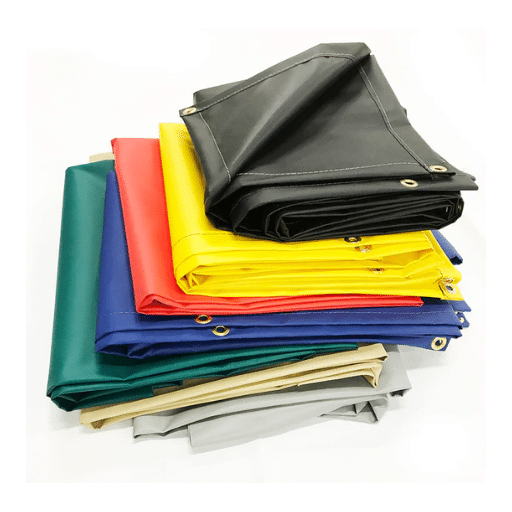When it comes to investment protection whether it’s for equipment, vehicles, or outdoor areas, locating trustworthy and resistant solutions is a must. Custom tarps and covers provide the same protection and versatility along with their being specially adjusted to fit the requirements of the individuals and the businesses. These heavy-duty products are made in the USA with such durability that they are able to resist all kinds of weather ensuring you get the long-lasting performance you can trust. In this paper, benefits of custom tarps and covers, their application in the industries, and the ways of customizing them to fit your needs perfectly will be discussed. No matter if you need weather protection, storage solutions, or covering specifically for your purpose, this guide will help you take the right pick. Let’s reveal the reasons why the quality made in the USA matters and how these custom products can offer you exceptional value.
Understanding Custom Tarps
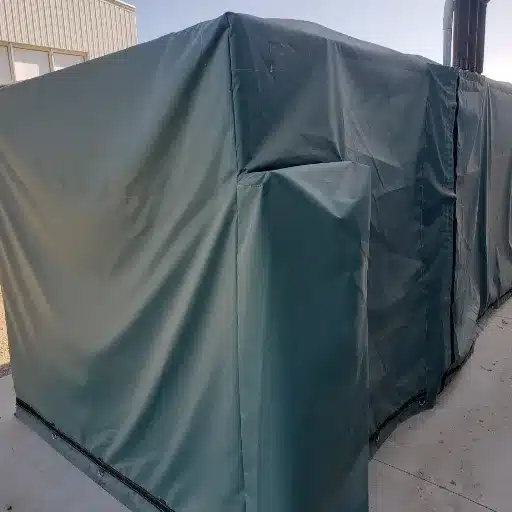
What is a Custom Tarp?
A custom tarp is a covering that is manufactured based on the customer’s specific requirements regarding dimensions, materials, and functionalities for different applications. Unlike standard tarps that are available in predetermined sizes and materials, the custom tarps are made to fit precisely according to the required unique shapes, structures, or devices. The choice of the material for the custom tarps is from a variety of long-lasting materials, including vinyl, canvas, polyester, and polyethylene according to the use. Custom tarps can be seen in a plethora of industries such as transportation, agriculture, construction, and manufacturing because of their versatility in applications like shielding goods from weather damage, setting up temporary enclosures, or creating barriers against dust and debris. Their adaptability gives the business and individual users the ability to achieve a perfect solution for problems that cannot be solved with standard products while getting the best in terms of performance, longevity, and efficiency.
Benefits of Custom Tarps
✓ Precise Fit and Functionality
Custom tarps are perfectly fit to size and shape for the specific purpose with the advantage of being tailored to the precise dimensions and functional needs of the project. This arrangement allows maximum coverage reducing the chances of vulnerable spots that could affect either the goods or the operations. Data trends demonstrate that the search for “custom industrial tarps” have increased portraying the demand for niched solutions in the construction and agriculture industries.
✓ Enhanced Durability
Most often, when custom tarps are made to specifications, they are made from the finest materials to withstand the specific environmental challenges like heat, rain, or wind. The longevity that comes with it translates into less cost for replacements which is a benefit that both businesses and individuals relying on uninterrupted performance would desire.
✓ Cost-Effectiveness Over Time
Custom tarps may be more expensive to manufacture than ready-made ones but through their tailored nature they ensure limited wastage and improved protection for valuable goods or equipment. Moreover, trending search behavior shows that the terms “cost-effective tarps” frequently appear in conjunction with “long-lasting tarps,” indicating the economic value of customization over time.
✓ Eco-Friendly Options
An increasing number of manufacturers are catering to the market demand for eco-friendly custom tarp options by using recycled or biodegradable materials, thereby aligning themselves with environmentally-friendly practices. Searches for “eco-friendly tarps” confirm that there is a growing trend among businesses and consumers that they are indeed prioritizing green solutions.
✓ Versatility Across Applications
Custom tarps can be used in every conceivable way from agricultural produce to event staging, the only limitation being the industry-specific need. Tarps are being used in sectors like transportation, manufacturing, and construction, so customization is vital for meeting very different industrial requirements. Consistent search volumes for phrases such as “custom construction tarps” and “agricultural tarp solutions” are among the evidence that supports this.
With their durability, cost-effectiveness and sustainability combined with precision, custom tarps are still and will always be an essential tool across industries and thus are continuously preferred as a response to changing market demands.
Common Uses for Custom Tarps and Covers
Custom tarps and covers are utilized in numerous ways across different sectors and what recent search trends show is only a part of their large scale versatility. One of the biggest areas of use is the safeguarding of products when they are being moved, which is particularly true for logistics and shipping where cargo is subjected to the elements and heavy-duty tarps are the only thing shielding it. Besides, they are crucial in the agricultural sector, where they act as silage covers, hay tarps, or crop protection sheets, retaining the utmost resources, and making the lifecycle of the production smoother. Custom tarps have different applications ranging from being the main players in scaffolding wraps to being covers for dust and safety at construction sites, thus playing a very big part in compliance and very small in noncompliance by they being used to cover the area around the site. Moreover, the recreational industry is also one of the sectors that always have a great need for these tarps since they use them for covering things like boats, RVs, and outdoor furniture to prolong the life of the products. Search data analysis further supports their significance with the regular appearance of queries like “construction tarps for sale” or “farm equipment tarp solutions” which signals their existence as flexible and extremely necessary instruments that are specialized for each industry need.
Types of Tarps Available
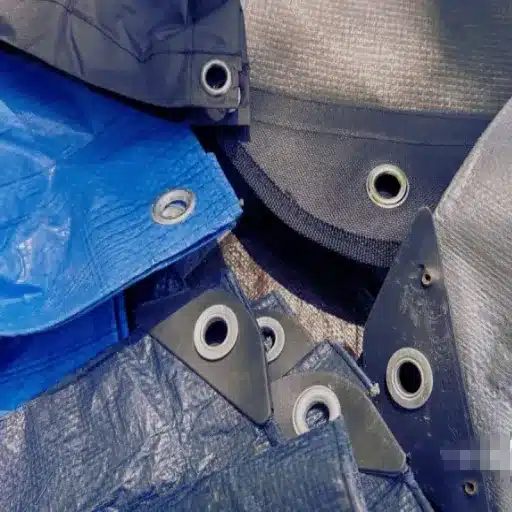
Heavy Duty Tarps: Strength and Durability
Heavy duty tarps are made to endure stringent conditions and tough operations. With the use of strong materials such as polyethylene, vinyl, or canvas, these tarps can resist tearing and will last a long time. “What makes heavy duty tarpsideal for industrial use?” is a query often made by people. This question is well answered by the features of these tarps: reinforced edges, waterproof coatings, and UV light protection. All these features make it possible for the tarps to be able to use them in different scenarios, from covering construction sites to protecting the equipment, or even providing weather-resistant protection for outdoor storage. Their ability to serve different purposes and being reliable at the same time are the reasons why they are being used in different industries making them the go-to solution for tough protection needs.
Canvas Tarps vs. Vinyl Tarps
While taking a look at canvas tarps and vinyl ones, a person has to think about the different characteristics and uses of the latter ones. “Which is better for my needs, canvas tarps or vinyl tarps?” is one of the top questions of search engine users according to the latest data from . The response varies depending on the usage. Canvas tarps are made of cotton which is breathable and durable. These materials have the ability to protect the area from moisture to a certain extent, through ventilation, thus being the best for items requiring airflow like machinery or agricultural equipment. In contrast, vinyl tarps grant the customer superior waterproofing and exceptional resistance to UV rays, chemicals, and abrasions. Hence, they are perfect for heavy-duty applications, such as covering construction materials or creating temporary outdoor shelters. Both types of tarps have their respective pros and cons, nevertheless, recognizing the particular requirements of your project is the right path to making the proper selection.
Poly Tarps: Cost-Effective Solutions
Poly tarps are a good choice when it comes to pricing and practicality for a great number of uses, and they are just as durable as any other options, if not more so. These polyethylene tarps are light in weight, easy to manage, and very adaptable. They can be used as a barrier to moisture and thus are recommended for covering equipment, firewood, or landscaping materials. Not only that, but the technology used in the production of these tarps has come to a point where it is very difficult for the tarps to lose their resistance to tearing or UV rays; thus, their life span has been extended. In making the decision as to whether the poly tarp is the solution you want, you would need to consider such factors as how long you are going to use it, how harsh the elements it will be exposed to are, and your budget. For short-term or moderate-duty needs, poly tarps still are the most effective and trustworthy option.
Buying Custom Tarps
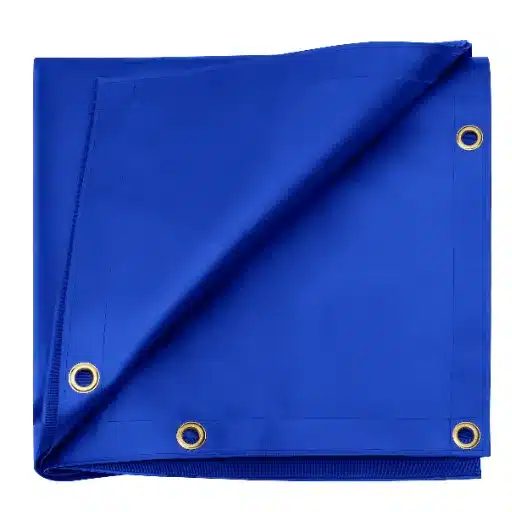
How to Choose the Right Size Tarp
Picking the right size tarp will vary based on a few considerable elements, and knowing exactly what you need is very important. First, you should measure the area or the object that you want to cover in terms of length, width, and height. If the tarp has to wrap around or secure beyond the edges for proper coverage, then it will be necessary to consider extra space. The listed dimensions of a tarp may often refer to its “cut size,” which is a little larger than the “finished size” due to the hemmed edges.
If you are going to use it for heavy-duty purposes, it would be good to choose a tarp that is slightly bigger, and that will give you the option of using grommets for proper tying down or securing in place. Conversely, for ground covers and temporary coverings, a snug fit may do. If you are in doubt, it is better to choose a bigger tarp as it will provide you with more options and at the same time you won’t have gaps in coverage. To make sure that you really get the most out of your purchase, read product specifications and customer reviews. By thoroughly considering your needs, you will be able to choose a tarp size that perfectly fits your situation.
Factors to Consider When Buying Custom Heavy Duty Tarps
1 Material Quality and Durability
The material quality and durability should be the main reasons for buying custom heavy-duty tarps. Heavy-duty tarps come mainly from polyethylene, vinyl, or canvas materials that each have different advantages. For instance, vinyl tarps are impervious to water and very appropriate for industrial applications, whereas canvas tarps are less resistant to water but more breathable, which makes them good for covering fragile things. To make sure the tarp will stand the test of time and weather, look for UV resistance, tear strength, and waterproof features in the product specifications.
2 Intended Application
Before getting a tarp, it is very important to clarify its purpose. Would the tarp serve to do outdoor storage, site protection, or agricultural activities? Sometimes heavy-duty tarps made for specific uses come with extra features such as grommets for tie-downs, fire-resistant coatings, or reinforced edges for extra strength. If the tarp is matched with the application it is going to be used for, it will naturally function better.
3 Size and Customization Options
The possibility of customizing the tarps according to your needs is one of the biggest benefits when it comes to custom tarpaulins. First, take accurate measurements of the area that is going to be covered and then add the allowance needed for tie-downs or overlaps. Some suppliers will also allow you to customize your order by choosing between having reinforced corners, color-matching, or an extra layer of protection.
4 Weather Resistance and Longevity
Resistance to weather conditions is one point that cannot be overlooked when it comes to heavy-duty tarps, especially if during their entire life they will be outside exposed to the elements. You might check if the tarp is manufactured to be resistant to UV rays, heavy winds, rain, and snow. A long warranty period with a product might be an indication of its durability which can provide a sense of security for long-term use.
5 Budget and Cost Efficiency
Lastly, while good quality usually means higher costs, try to find a perfect balance between the tarp features and your budget. Reading reviews and comparing products online can help you find out which models have good performance and are within your price range. It is usually more economical in the long run to invest in a sturdy, high-quality tarp rather than to replace frequently the low-quality ones that you spend less money on.
Key Takeaway: These factors, when thoroughly evaluated, will enable you to select with confidence a custom heavy-duty tarp that not only meets your needs but also offers long-term value.
Where to Buy Made in the USA Tarps
If you want to get the best USA tarps that are quality-wise up to the mark, there are a few trustworthy alternatives you can go for. Tarps Plus, MyTarp, and US Netting are online retailers, and they specialize in American-made tarps, as well as giving a range of sizes, materials, and customization options. Furthermore, Chicago Canvas & Supply, along with Cover-Tech, are well-known brands that strive to manufacture long-lasting tarps in the USA thereby ensuring excellent craftsmanship and meeting the quality of USA standards. For custom tarps, many of these companies allow you to adjust the specifications to match your specific needs.
Besides, the local hardware stores, farm supply stores, and outdoor retail stores might have American-made tarps. Unbranded stores usually declare that they only sell products made in the USA, thus, you might support both local and domestic manufacturing by purchasing from “indie” stores. Always check product tags and confirm “Made in the USA” certification when buying to assure that you are getting an authentic product. Finding a reliable, US-made tarp that meets your needs is now easier than ever since you have numerous options both in online and offline stores.
Applications of Custom Tarps
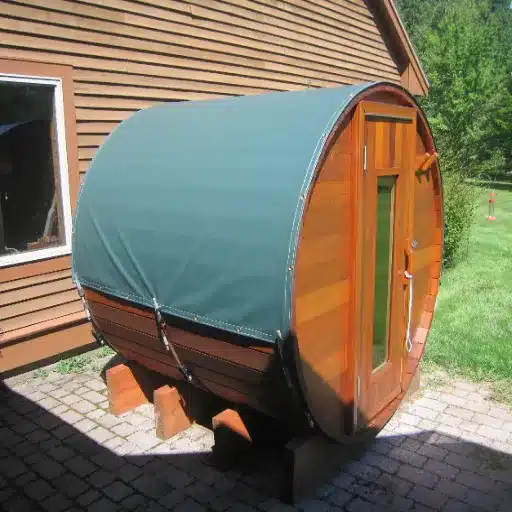
Industrial Applications of Tarps
Tarpaulins, or tarps, are widely used in the different branches of industry owing to their flexibility, durability, and low cost. The most typical uses are to cover machinery and equipment so that they are not damaged by bad weather, to cover raw materials to keep them from getting contaminated, and to provide temporary shelters at construction sites and other similar places. Tarps are often made for specific demands of different industries like construction, agriculture, and manufacturing. For example, heavy-duty tarps are used on construction sites to protect the scaffolding, while flame-retardant tarps are crucial in areas where industrial safety measures are being enhanced. The versatility of tarps helps them continue to be the indispensable part of industrial processes, thus resulting in both protection and efficiency over a wide range of cases.
Fumigation Tarps and Their Uses
Fumigation tarps are the mainstay during the whole process of application, containment, and purging of the fumigants in agriculture, industry and pest control as they provide a sealed environment for the fumigants to do their work. The primary reason why these tarps are used is to get rid of pests, insects, or pathogens in stored produce, soils, or buildings, which in turn guarantees complete disinfection and pest management. Fumigation tarps made from strong, anti-gas materials are the ones that provide an air-tight barrier in which the fumigants’ escape is completely prevented, thus making it possible for the operation to be both very effective and safe.
The latest search engine trends indicate that users often ask about the advantages of fumigation tarps for soil sterilization and grain protection. Such queries denote the increased awareness among people about fumigation as one of the better ways to enhance crop yield and protect inventory from infestation. Fumigation tarps offer deep penetration of the chemical into the targeted areas thereby providing extensive coverage with little environmental exposure. This is the reason why they are regarded as one of the most important assets for those who give priority to agriculture’s health and operational safety.
Custom Tarps for Agriculture
Custom tarps are one of the most important elements in the modern agricultural script, as they provide bespoke answers for the reclamation of crops, shielding equipment, and preventing livestock from being subjected to sudden and unpredictable climate changes. The custom tarps are made to cater to the needs of each customer in terms of size, material, and toughness. For this reason, these tarps are made to last and be as efficient as possible. Recent data from online search trends indicate that farmers and agricultural businesses are increasingly looking for ways and solutions to protect their assets from heavy rain, high UV exposure, and frost damage. Custom tarps respond to these problems by providing UV resistance, waterproofing, and insulation as their main attributes, thus making them a must-have for protecting agricultural productivity and minimizing losses.
Care and Maintenance of Tarps
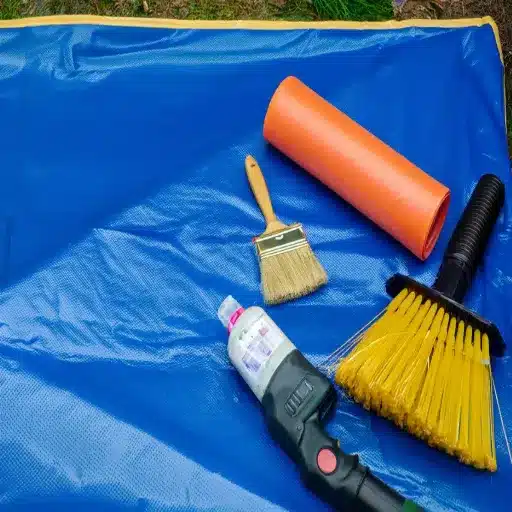
How to Clean and Store Your Tarps
In the tarps’ longevity fight, proper care and maintenance are the first line of defense. The latest data from search trends show that people are eager to know about cleaning and storing tarps that would lead to their maximum durability and effectiveness. The first step to cleaning your tarp is getting rid of the dirt using a soft-bristle brush or a cloth. If there are any tough stains, you can use a mixture of mild soap and water; however, do not use harsh chemicals as they may affect the tarp material or the protective coatings. Rinse thoroughly and then hang the tarp up to dry completely in the shade to avoid the growth of mold or mildew.
When it comes to tarp storage, fold them properly and place them in a cool and dry spot where UV rays cannot reach them to keep the tarps from sun damage. Use containers or bags that are waterproof for storing to keep them from getting wet and being eaten by critters. Inspection of tarps at regular intervals is also crucial; check often for holes or weak areas and fix them with the same method to stop other damage from happening. If you go through the above processes, then you can expect that your tarps will be good to use and help you in your work for many more years.
Extending the Lifespan of Heavy-Duty Tarps
The life span of heavy-duty tarps can be very long if the maintenance is done right and the owner makes decisions based on the latest updates. The search trends show the same thing, that a lot of people are looking for ways of extending the tarp’s life by using various good practices during the bad weather conditions. One of the methods that are very good and effective is to use the tarp reinforcement methods for example, changing the position of the grommets or putting ropes around the edges to minimize tearing at the points where the stress is. Investing in the UV-resistant shelters is also positioning up the popular recommendations list since sun exposure for a long time is one of the major degrading factors.
Additionally, using high-quality polyethylene or PVC-coated tarp covers gives better durability in outdoor or industrial usages, especially when it comes to tarp made of a lesser material. It can even be a good idea to rotate or to reposition your tarp sometimes if it is continually subjected to strain or harsh settings. Search insights show that cleaning with mild soap and water and avoiding the use of strong chemicals that could weaken the material are still among the highest principles when it comes to tarps maintenance. By stick to these guidelines together with the latest advice, you should be able to significantly extend the time your heavy-duty tarps remain uncollected and unreliant.
Repairing Minor Damage on Tarps
The minor damage on tarps like small holes or cuts gets sometimes repaired with success and thus, their functionality gets restored along with the prevention of further wear. According to data based on searches, one of the simplest solutions for small rips would be to use a particular tarp repair tape that is made specifically for the purpose and it would efficiently give a strong and non-leaking seal at the same time. If the damage is quite big, think about placing a patch made of similar material as the tarp, and secure it either with glue or sew it, if that material permits. Clean and dry the area where the damage is before you apply any of the repairs so that adhesion will be good. Regular maintenance and repair work on small damages may save money and prolong the life of your tarp, making it more usable.
💡 Pro Maintenance Tips
- ✓ Regular Cleaning: Remove dirt with a soft-bristle brush and mild soap
- ✓ Proper Storage: Keep in cool, dry places away from UV rays
- ✓ Quick Repairs: Use specialized tarp repair tape for minor damage
- ✓ UV Protection: Invest in UV-resistant materials for extended lifespan
- ✓ Regular Inspection: Check for holes and weak areas frequently
Frequently Asked Questions (FAQ)
Reference Sources
📚 Discovering the Best Truck Tarpaulin Options
This source discusses the durability, UV resistance, and waterproof properties of PVC tarpaulin truck covers.
📚 Leading PVC Tarpaulin Manufacturer & Supplier in China
This article highlights tailored solutions for custom tarps used in transporting goods, covering machinery, and protecting agricultural products.
📚 Safespan TM: Multi-Span Bridge Decking and Shielding
This academic source from Purdue University discusses reusable components and custom designs for structural engineering projects.



